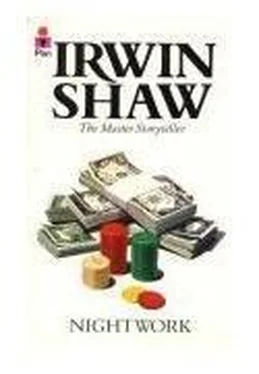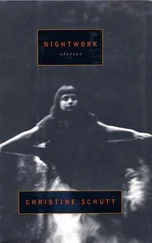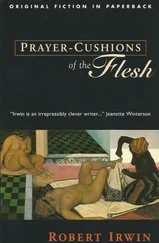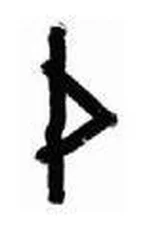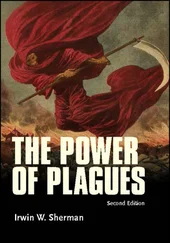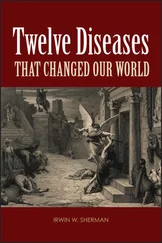Irwin Shaw - Nightwork
Здесь есть возможность читать онлайн «Irwin Shaw - Nightwork» весь текст электронной книги совершенно бесплатно (целиком полную версию без сокращений). В некоторых случаях можно слушать аудио, скачать через торрент в формате fb2 и присутствует краткое содержание. Жанр: Детектив, на английском языке. Описание произведения, (предисловие) а так же отзывы посетителей доступны на портале библиотеки ЛибКат.
- Название:Nightwork
- Автор:
- Жанр:
- Год:неизвестен
- ISBN:нет данных
- Рейтинг книги:3 / 5. Голосов: 1
-
Избранное:Добавить в избранное
- Отзывы:
-
Ваша оценка:
- 60
- 1
- 2
- 3
- 4
- 5
Nightwork: краткое содержание, описание и аннотация
Предлагаем к чтению аннотацию, описание, краткое содержание или предисловие (зависит от того, что написал сам автор книги «Nightwork»). Если вы не нашли необходимую информацию о книге — напишите в комментариях, мы постараемся отыскать её.
Nightwork — читать онлайн бесплатно полную книгу (весь текст) целиком
Ниже представлен текст книги, разбитый по страницам. Система сохранения места последней прочитанной страницы, позволяет с удобством читать онлайн бесплатно книгу «Nightwork», без необходимости каждый раз заново искать на чём Вы остановились. Поставьте закладку, и сможете в любой момент перейти на страницу, на которой закончили чтение.
Интервал:
Закладка:
“I wouldn’t know,” I said, “although Evelyn hinted…” “It happened before,” Lorimer said, “and it sure as hell can happen again, with what’s going on in Washington. What McCarthy did to the old China hands for coming in with an unpopular message will look like a tea party compared to what that bunch in the White House are capable of pulling off. Orwell was wrong. It shouldn’t have been nineteen eighty-four. It should have been nineteen seventy-three. Do you think they’ll get that second-story man out of the White House?”
I shrugged. “I haven’t been following it closely,” I said. Lorimer looked at me oddly. “Americans.” He shook his head sadly. “My bet is he’ll still be there till the next election. With his foot on all our necks. My next post will probably be in some small African country where they have a coup d’etat every three months and shoot American ambassadors. Come and visit me.” He grinned and poured himself a full glass of wine. Whatever he was, he wasn’t frightened. “I’m afraid I won’t be able to devote any time to you this week. I have to go to Naples for a few days. But I can get back for tennis again on Saturday and there’s a poker game on Saturday night, mostly newspapermen, nobody from the embassy… A Evelyn wrote you were a devout poker player…”
“I’m sorry.” I said. “I won’t be here. I have to be in Porto Ercole Saturday.”
“Porto Ercole?” he said. “The Pellicano?”
“As a matter of fact, I have a reservation there.”
“For a fellow who’s just arrived in Italy, you know your way around. The Grand in Rome, the Pellicano in Porto Ercole.”
“I’ve been briefed by a friend,” I said. “He knows his way around everywhere.”
“You’ll love it,” Lorimer said. “I go up there for weekends whenever I can. They have a nice tennis court. I envy you.” He looked at his watch, then started to pull out his wallet to pay.
“Please,” I said. “On me.”
He put his wallet back. “Evelyn wrote you were independently wealthy. Is that true?”
“More or less,” I said.
“Three cheers for you. In that case, it’s your lunch.” He stood up. “Do you want me to drive you back to the hotel?”
“I think I’d like to walk.”
“Well thought out,” he said. “I wish I had the time to walk with you. But the executioners await. Arrivederci, chum.” He strode off, toward his car, brisk and American, the statues looming over him, toward the desk on which the papers had been moved in his absence.
I finished my coffee slowly, paid and walked leisurely in the general direction of the hotel, reflecting that Rome, as seen by a pedestrian, was a different and much better city than Rome seen from an automobile. For that afternoon, at least. Lorimer’s description of Italy as a beautiful, lamentable country, peopled with desperate inhabitants, seemed only partially correct.
I found myself on a narrow busy street, the via de Babuino, where there were several art galleries. Faithful to Fabian, I peered in through the windows. In one of the windows there was a large oil of a deserted street in a small town in America, the familiar drugstore, barbershop, fake Colonial bank, a clapboard newspaper office, all in what looked like the last faded night of a cold evening in the middle of flat prairie country. It was painted realistically, but realism heightened by an obsessed attention to every smallest detail, which gave the impression of a distorted, fanatical vision of the country, loving and furious at the same time. The name of the painter who was having the one-man show in the gallery was not an American one – or perhaps half an American one, Angelo Quinn. Out of curiosity I went into the gallery. Aside from the man who ran the place, a wispy, gray-haired sexagenarian in a high collar, and a youngish, sloppily dressed man in need of a shave who sat in a corner reading an art magazine, I was the only one in the shop.
All the paintings were of small towns or dilapidated old sections of cities, with here and there a weather-worn farmhouse set on a bleak, windy hill, or a rusted line of railroad tracks, with frozen puddles reflecting a dark sky, the tracks looking as though they were going nowhere and as if the last train had passed that way a century before.
There were no little red stamps on the frames to indicate that any of the paintings had been sold. The owner of the gallery did not follow me around or offer to talk to me, but merely gave me a sad little dental-plate smile when he caught my eye. The young man with the art magazine never looked up.
I left the gallery saddened, but somehow also uplifted. I wasn’t certain enough about my taste to be able to pronounce whether or not the paintings were good or bad, but they had spoken to me directly, had reminded me, elusively but surely, of something I didn’t want to forget about my native country.
I walked slowly through the bustling streets, puzzling over the experience. It was very much like what I had felt about books at the age of thirty, when I had begun to read seriously, the sense that something enormous and enigmatic was being tantalizingly revealed to me. I remembered what Fabian had said the morning we had visited the Maeght Museum in St-Paul-de-Vence – that after I had looked enough I would pass a certain threshold of emotion. I resolved to come back again the next day.
Near my hotel, by accident, I noticed that I was passing the shop that Fabian had told me was the place I should get my suits made. I went in and spent an interesting hour looking at materials and talking to the head tailor, who spoke a kind of English. I ordered five suits. I would dazzle Fabian when I saw him next.
The next day I got a directory of the art galleries in Rome that were having exhibitions that week and I visited all of them before going back to Quinn’s show. I wanted to see how the other contemporary works of art on view in the city affected me. They affected me not at all. Realistic, surrealist, abstract, my eye remained unmoved. Then I went back to the gallery on the via del Babuino and slowly drifted from painting to painting, studying each one carefully and critically, to make sure that what I had felt the afternoon before had not been the result of its having been my first day in Rome, following a good lunch with plenty of wine and the pleasure of conversation with a knowing young American after a week of silence.
The effect on me was, if anything, greater than it had been the day before. The gallery owner and the young man with the art magazine were again the only ones in the shop, looking as though they had not moved in the last twenty-four hours. If they recognized me, they gave no sign that they did so. If I can afford to buy suits, I decided suddenly, I can afford to buy a painting. I had never bought even as much as a print before and was unsure about how one went about it. Fabian had haggled with the dealer in Zurich, but I knew I wasn’t up to that.
“Excuse me,” I said to the wispy old gallery owner, who smiled automatically at me, “I’m interested in the painting in the window. And maybe this one, too.” I was standing in front of the oil of the disused railroad tracks. “Could you give me some idea of how much they might be?”
“Five hundred thousand lire,” the old man said promptly. His voice was strong and steady.
“Five hundred thousand … Uh …” It sounded monumental. I still suffered from fits of apprehension when dealing with the Italian decimal system. “How much is that in dollars?” Tourist, tourist, I thought bitterly as I asked the question.
“About eight hundred dollars.” He shrugged despondently. “With the ridiculous rate of exchange, less.”
I was paying two hundred and fifty dollars for each of the five suits. They would never give me as much pleasure as either of the paintings. “Will you take a check on a Swiss bank?”
Читать дальшеИнтервал:
Закладка:
Похожие книги на «Nightwork»
Представляем Вашему вниманию похожие книги на «Nightwork» списком для выбора. Мы отобрали схожую по названию и смыслу литературу в надежде предоставить читателям больше вариантов отыскать новые, интересные, ещё непрочитанные произведения.
Обсуждение, отзывы о книге «Nightwork» и просто собственные мнения читателей. Оставьте ваши комментарии, напишите, что Вы думаете о произведении, его смысле или главных героях. Укажите что конкретно понравилось, а что нет, и почему Вы так считаете.
